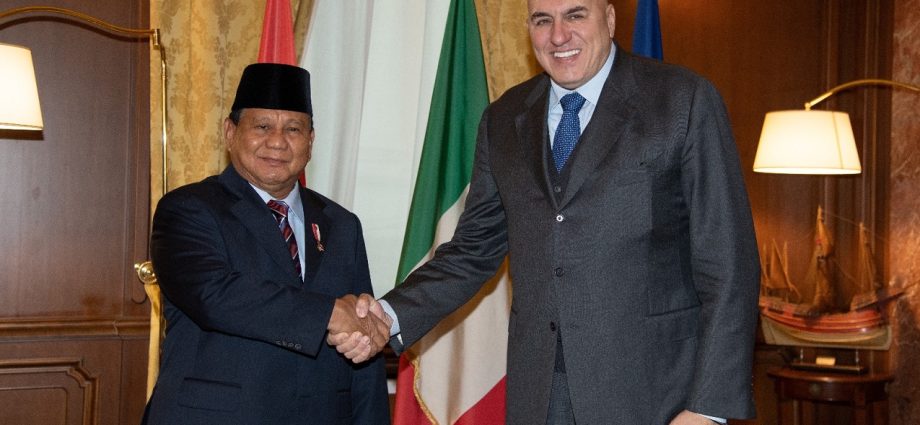While Italy’s traditional geostrategic area of reference is the “enlarged Mediterranean“, the growing importance of the Indo-Pacific from an economic and geopolitical standpoint has piqued Rome’s interest. Italy does not yet possess an articulated Indo-Pacific strategy.
But a document released by the Italian Ministry of Foreign Affairs in January 2022 underscores how Rome’s involvement in the Indo-Pacific theater is already longstanding. Present and future initiatives are meant to be multilateral, inclusive and substantially in line with the European Union’s strategic priorities.
A key interest of Italian Prime Minister Giorgia Meloni’s government is signaling the importance of upholding the rules-based order in the region. Rome’s strategic outreach in the Indo-Pacific is primarily addressed towards substantial regional players.
Meloni’s visit to India in March 2023 was instrumental in relaunching defense talks, and diplomatic efforts with Japan have elevated Japan-Italy relations to the level of a “strategic partnership” since January 2023.
While often under the media’s radar, Italian foreign policy has also already designated Southeast Asia as a significant zone of interest, in terms of both the concerns of individual states and the Association of Southeast Asian Nations (ASEAN).
A top priority has been the expansion of trade and economic interconnections. In line with this, since 2017, the annual High-Level Dialogue on ASEAN-Italy Economic Relations has grouped together political and business leaders to discuss possible avenues to increase the volume of exchanges in what is framed as a “strategic market” for Italian enterprises.
In parallel, Italy has been particularly keen to gear up its security role, especially in the maritime domain.
Between May and June 2023, the Morosini carried out different activities in Southeast Asia, paying visits to ports like Ho Chi Minh City and Bangkok, participating in defense exhibitions in Malaysia and Singapore and notably taking part for the first time in the Indonesia-led multinational search and rescue “Komodo-23” exercise.

Defense relations with Jakarta are especially on the rise. The Italian Defense Minister Guido Crosetto visited the country in December 2022 to boost defense and industrial cooperation.
The visit can also be read through the lens of the 2021 deal between Italian shipbuilding company Fincantieri and the Indonesian Navy for the acquisition of eight frigates, which represents an important milestone in the ongoing modernization of the Indonesian armed forces.
Another key regional partner is Vietnam. In 2013, Rome and Hanoi decided to upgrade their relationship to the level of a strategic partnership. Under this framework, the two nations have been conducting a dialogue on defense-related issues.
Italy has also been a frontrunner in forging ties with different regional organizations in the Indo-Pacific, such as the Pacific Islands Forum, the Indian Ocean Rim Association and ASEAN. The attention of Italian business and diplomatic communities towards ASEAN has manifested through the intensification of institutional meetings involving the two sides.
In September 2020, ASEAN Foreign Ministers decided to confer to Italy the status of Development Partner, in a move that further deepened and institutionalized cooperation in sectors such as cybersecurity, maritime development and anti-piracy.
Southeast Asia represents one of the focus sub-regions in the context of Italy’s nascent ambitions in the Indo-Pacific. But there are important open-ended issues to reflect upon.
One relates to how long term this activism will be. While Meloni’s Italian government has put the Indo-Pacific and Southeast Asia on its geopolitical map, in the medium to long term there is the risk that, with the ongoing war in Ukraine, Italy may eventually reshift its attention and resources closer to Italy’s core strategic perimeter.
There is also the question of Italy’s relationship with China. The Italian government has yet to make a final decision about the renewal of a Belt and Road Initiative-related memorandum signed in 2019.
While some underline that Italy has gradually distanced itself from China and will likely decide not to extend the agreement, Meloni has highlighted that Rome could potentially stay on good terms with China even outside the Belt and Road Initiative framework.

Yet, recent declarations by the Chinese ambassador to Italy hint that an abandonment of the memorandum would inevitably have an impact on the relationship.
This begs the question of how Italy will position itself if China increases its assertiveness in the South China Sea. How concretely Italy would respond to a contingency in the area is not easy to predict.
The articulation of an official Indo-Pacific strategy is then a fundamental step forward for Italy in order to answer strategic questions, keep building on a quite successful record and clearly delineate its priorities and goals for future engagement with Southeast Asia.
Fabio Figiaconi is PhD candidate in the Brussels School of Governance, Vrije Universiteit Brussel.
This article was originally published by East Asia Forum and is republished under a Creative Commons license.

